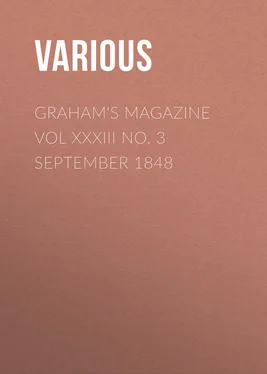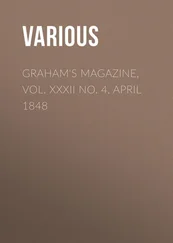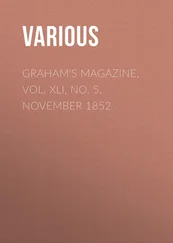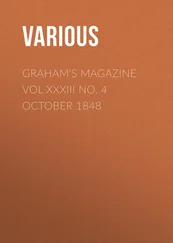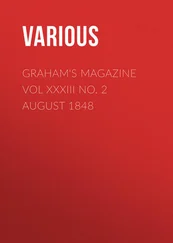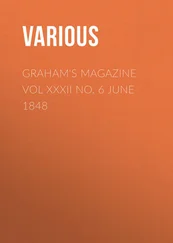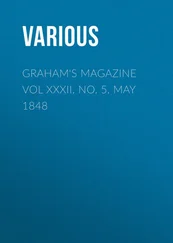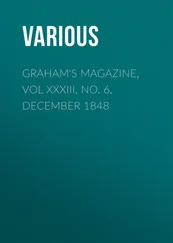Various - Graham's Magazine Vol XXXIII No. 3 September 1848
Здесь есть возможность читать онлайн «Various - Graham's Magazine Vol XXXIII No. 3 September 1848» — ознакомительный отрывок электронной книги совершенно бесплатно, а после прочтения отрывка купить полную версию. В некоторых случаях можно слушать аудио, скачать через торрент в формате fb2 и присутствует краткое содержание. Издательство: Иностранный паблик, Жанр: periodic, literature_19, foreign_edu, на английском языке. Описание произведения, (предисловие) а так же отзывы посетителей доступны на портале библиотеки ЛибКат.
- Название:Graham's Magazine Vol XXXIII No. 3 September 1848
- Автор:
- Издательство:Иностранный паблик
- Жанр:
- Год:неизвестен
- ISBN:нет данных
- Рейтинг книги:3 / 5. Голосов: 1
-
Избранное:Добавить в избранное
- Отзывы:
-
Ваша оценка:
- 60
- 1
- 2
- 3
- 4
- 5
Graham's Magazine Vol XXXIII No. 3 September 1848: краткое содержание, описание и аннотация
Предлагаем к чтению аннотацию, описание, краткое содержание или предисловие (зависит от того, что написал сам автор книги «Graham's Magazine Vol XXXIII No. 3 September 1848»). Если вы не нашли необходимую информацию о книге — напишите в комментариях, мы постараемся отыскать её.
Graham's Magazine Vol XXXIII No. 3 September 1848 — читать онлайн ознакомительный отрывок
Ниже представлен текст книги, разбитый по страницам. Система сохранения места последней прочитанной страницы, позволяет с удобством читать онлайн бесплатно книгу «Graham's Magazine Vol XXXIII No. 3 September 1848», без необходимости каждый раз заново искать на чём Вы остановились. Поставьте закладку, и сможете в любой момент перейти на страницу, на которой закончили чтение.
Интервал:
Закладка:
Various
Graham's Magazine Vol XXXIII No. 3 September 1848
ANGILA MERVALE;
"They say Miss Morton is engaged to Robert Hazlewood," said Augusta Lenox.
"So I hear," replied Angila Mervale, to whom this piece of news had been communicated. "How can she?"
"How can she, indeed?" replied Augusta. "He's an ugly fellow."
"Ugly! yes," continued Angila, "and a disagreeable ugliness, too. I don't care about a man's being handsome – a plain black ugliness I don't object to – but red ugliness, ah!"
"They say he's clever," said Augusta.
"They always say that, my dear, of any one that's so ugly," replied Angila. "I don't believe it. He's conceited, and I think disagreeable; and I don't believe he's clever."
"I remarked last night that he was very attentive to Mary Morton," continued Augusta. "They waltzed together several times."
"Yes, and how badly he waltzes," said Angila. "Mary Morton is too pretty a girl for such an awkward, ugly man. How lovely she looked last night. I hope it's not an engagement, for I quite like her."
"Well, perhaps it is not. It's only one of the on dits , and probably a mere report."
"Who are you discussing, girls?" asked Mrs. Mervale, from the other side of the room.
"Robert Hazlewood and Miss Morton," replied Augusta, "they are said to be engaged."
"Ah!" said Mrs. Mervale. "Is it a good match for her?"
"Oh, no! chimed in both the girls at once. "He's neither handsome, nor rich, nor any thing."
"Nor any thing!" repeated Mrs. Mervale, laughing. "Well, that's comprehensive. A young man may be a very respectable young man, and be a very fair match for a girl without being either handsome or rich; but if he is positively 'nothing,' why, then, I grant you, it is bad indeed."
"Oh, I believe he is respectable enough," replied Augusta, carelessly, for, like most young girls, the word "respectable" did not rank very high in her vocabulary.
"And if he is not rich, what are they to live on," asked Mrs. Mervale.
"Love and the law, I suppose," replied her daughter, laughing. "He's a lawyer, is he not Augusta?"
"Oh!" resumed Mrs. Mervale, "he's a son, then, I suppose, of old John Hazlewood."
"Yes," replied Augusta.
"Then he may do very well in his profession," continued Mrs. Mervale, "for his father has a large practice I know, and is a very respectable man. If this is a clever young man, he may tread in his father's footsteps."
This did not convey any very high eulogium to the young ladies' ears. That young Robert Hazlewood might be an old John Hazlewood in his turn and time, did not strike them as a very brilliant future. In fact they did not think more of the old man than they did of the young one.
Old gentlemen, however, were not at quite such a discount with Mrs. Mervale as with her daughter and her friend; and she continued to descant upon the high standing of Mr. Hazlewood the elder, not one word in ten of which the girls heard, for she, like most old ladies, once started upon former times, was thinking of the pleasant young John Hazlewood of early days, who brought back with him a host of reminiscences, with which she indulged herself and the girls, while they, their heads full of last night's party and Mary Morton and Robert Hazlewood, listened as civilly as they could, quite unable to keep the thread of her discourse, confounding in her history Robert Hazlewood's mother with his grandmother, and wondering all the while when she would stop, that they might resume their gossip.
"You visit his sister, Mrs. Constant, don't you?" asked Augusta.
"Yes, we have always visited the Hazlewoods," replied Angila, "but I am not intimate with any of them. They always seemed to me those kind of pattern people I dislike."
"Is Mr. Constant well off?" inquired Mrs. Mervale.
"No, I should think not," replied Angila, "from the way in which they live. They have a little bit of a two-story house, and keep only a waiter girl. How I do hate to see a woman open the door," she continued, addressing Augusta.
"So do I," replied her friend. "I would have a man servant – a woman looks so shabby."
"Yes," returned Angila. "There's nothing I dislike so much. No woman shall ever go to my door."
"If you have a man servant," suggested Mrs. Mervale.
"Of course," said Angila; "and that I will."
"But suppose you cannot afford it," said her mother.
"I don't choose to suppose any thing so disagreeable or improbable," replied her daughter, gayly.
"It may be disagreeable," continued Mrs. Mervale, "but I don't see the improbability of the thing, Angila, nor, indeed, the disagreeability even. The Constants are young people with a small family, and I think a woman is quite sufficient for them. Their house is small, I suppose."
"Oh, yes, a little bit of a place."
"Large enough for them," replied Mrs. Mervale, whose ideas were not as enlarged as her daughter's.
"Perhaps so," said Angila, "but I do hate low ceilings so. I don't care about a large house, but I do like large rooms."
"You can hardly have large rooms in a small house," remarked Mrs. Mervale, smiling.
"Why, Mrs. Astley's is only a two-story house, mamma, and her rooms are larger than these."
"Yes, my dear, Mrs. Astley's is an expensive house; the lot must be thirty feet by – "
But Angila had no time to go into the dimensions of people's "lots." She and Augusta were back to the party again; and they discussed dresses, and looks, and manners, with great goût .
Their criticisms were, like most young people's, always in extremes. The girls had either looked "lovely" or "frightful," and the young men were either "charming" or "odious;" and they themselves, from their own account, had been in a constant state of either delight or terror.
"I was so afraid Robert Hazlewood was going to ask me to waltz," said Angila; "and he waltzes so abominably that I did not know what I should do. But, to my delight, he asked me only for a cotillion, and I fortunately was engaged. I was so glad it was so."
"Then you did not dance with him at all?"
"No – to my great joy, he walked off, angry, I believe."
"Oh, my dear!" remonstrated her mother.
"Why not, mother," replied Angila. "He's my 'favorite aversion.' Well, Augusta," she continued, turning to her friend, "and when do you sail for New Orleans?"
"On Monday," replied Augusta.
"On Monday! – so soon! Oh, what shall I do without you, Augusta!" said Angila, quite pathetically. "And you will be gone six months, you think?"
"Yes, so papa says," replied the young lady. "He does not expect to be able to return before May."
"Not before May! And its only November now!" said Angila, in prolonged accents of grief. "How much may happen in that time!"
"Yes," returned her friend, gaily, "you may be engaged before that."
"Not much danger," replied Angila, laughing.
"But remember, I am to be bridemaid," continued Augusta.
"Certainly," said Angila, in the same tone, "I shall expect you from New Orleans on purpose."
"And who will it be to, Angila," said Augusta.
"That's more than I can tell," replied Angila; "but somebody that's very charming, I promise you."
"By the way, what is your beau ideal , Angila, I never heard you say," continued Augusta.
"My beau ideal is as shadowy and indistinct as one of Ossian's heroes," replied Angila, laughing; "something very distinguished in air and manners, with black eyes and hair, are the only points decided on. For the rest, Augusta, I refer you to Futurity," she added, gayly.
"I wonder who you will marry!" said Augusta, with the sudden fervor of a young lady on so interesting a topic.
Читать дальшеИнтервал:
Закладка:
Похожие книги на «Graham's Magazine Vol XXXIII No. 3 September 1848»
Представляем Вашему вниманию похожие книги на «Graham's Magazine Vol XXXIII No. 3 September 1848» списком для выбора. Мы отобрали схожую по названию и смыслу литературу в надежде предоставить читателям больше вариантов отыскать новые, интересные, ещё непрочитанные произведения.
Обсуждение, отзывы о книге «Graham's Magazine Vol XXXIII No. 3 September 1848» и просто собственные мнения читателей. Оставьте ваши комментарии, напишите, что Вы думаете о произведении, его смысле или главных героях. Укажите что конкретно понравилось, а что нет, и почему Вы так считаете.
